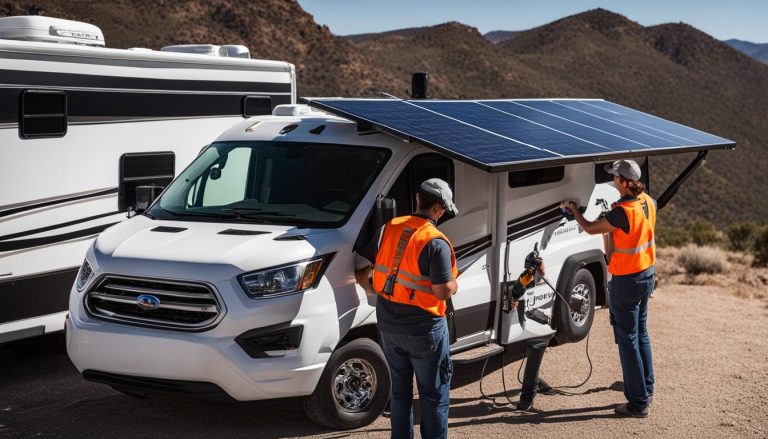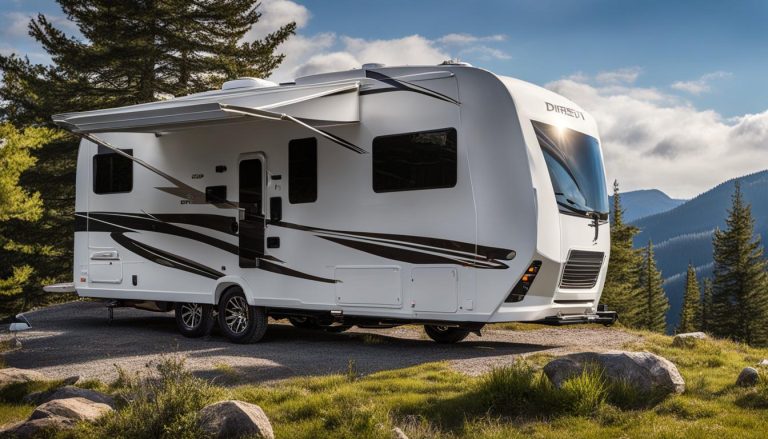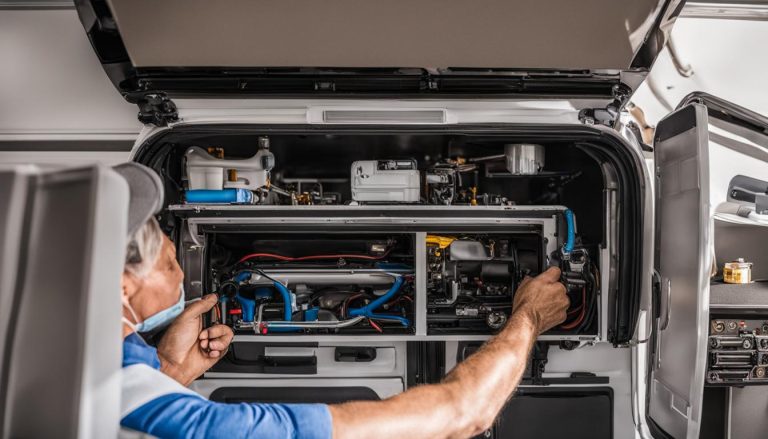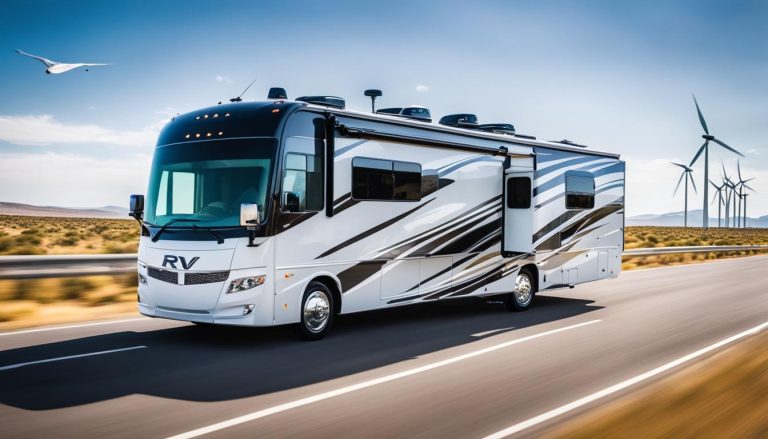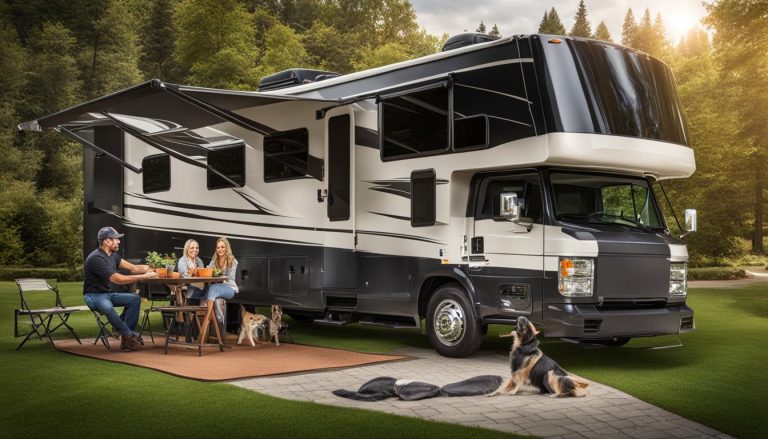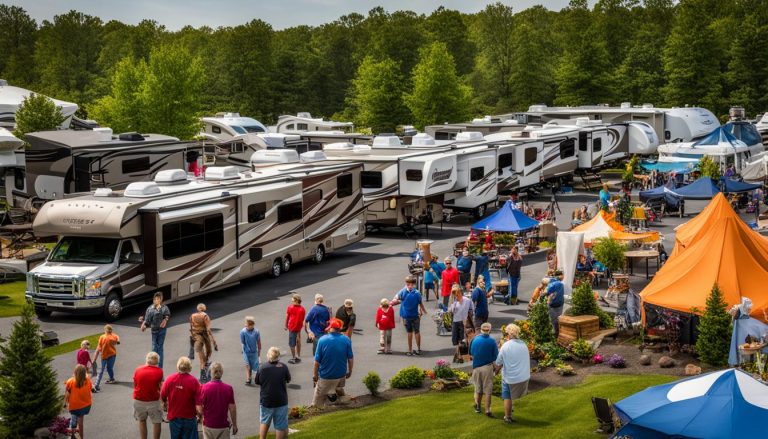Connect Your RV to Home Easily – Quick Guide
gorvlifestyle.com and its partners may earn a commission if you purchase a product through one of our links
If you’re an RV owner, you may find yourself wanting to connect your RV to your home’s electrical system for various reasons. Whether you want to prepare your RV for an upcoming trip or need to access the electrical system, it’s important to know how to hook up your RV to your house safely and effectively.
Before diving into the process of connecting your RV to your house, it’s crucial to understand a few key points. While it’s not recommended to live in an RV outside a home for an extended period, you can still connect it for short trips or maintenance purposes. However, it’s essential to ensure you have the necessary setup to provide the appropriate power to your RV.
RVs typically require a 30/50 Amp hookup to power all the appliances and systems. Keep in mind that a standard household electrical outlet typically provides only a 15/20 Amp electrical outlet. Therefore, you have two options to connect your RV to your home: either install the necessary setup when you buy the RV or set up a 30/50 Amp hookup at your home.
If you’re using a standard household outlet, you can use an outdoor extension cord and an adapter to connect your RV. However, it’s crucial to turn off all appliances in your RV before plugging in the extension cord to prevent any electrical issues. If the breaker trips, check all appliances inside your RV and try again. It’s also important to note that without a fully operational RV pad at home, you’ll likely only be able to use one appliance at a time in most cases to prevent overloading the electrical system.
Key Takeaways:
- Connecting your RV to your home’s electrical system is possible but requires the appropriate setup and understanding of power requirements.
- RVs typically require a 30/50 Amp hookup, while standard household outlets provide only a 15/20 Amp electrical outlet.
- You can either install the necessary setup when you buy the RV or set up a 30/50 Amp hookup at your home.
- If using a standard household outlet, you can use an outdoor extension cord and an adapter.
- Make sure to turn off all appliances before plugging in the extension cord and be cautious of overloading the electrical system without a fully operational RV pad at home.
Understanding Power and Water Hookups for Your RV
Power and water are essential for a comfortable RV camping experience. Let’s take a closer look at RV power hookup and RV water hookup, as well as the electrical system and hookup systems that ensure a smooth and enjoyable trip.
When it comes to power hookup, also known as shore power, RVs typically require either 30 amp or 50 amp electrical service. The plug on your RV’s shore power cord will help you determine the amp that your RV needs. If you encounter a different amp system, don’t worry! Adapters are available to convert between different amp systems, ensuring compatibility with various power sources.
Now let’s move on to water hookup. Connecting your RV to a city water source allows you to have a continuous supply of water. Many RVs are equipped with a city water connection conveniently located on the exterior wall, making it easy to access and connect to the water source. For situations where a city water connection is not available, you can fill your freshwater tank for an onboard water supply. Keep in mind that filling your freshwater tank requires a non-threaded opening, so make sure you have the appropriate tools or adapters.
To ensure the quality and proper function of the water supply, it’s recommended to use a pressure regulator and an inline filter. These accessories will help regulate water pressure and remove any impurities, providing you with clean and reliable water throughout your RV camping experience.
Power and Water Hookup Tips:
- Always check the electrical requirements of your RV before connecting to a power source.
- Carry appropriate adapters to ensure compatibility with different amp systems.
- Inspect the city water connection for any leaks or damages before connecting.
- Use a pressure regulator and inline filter to maintain water quality.
- Follow the manufacturer’s instructions and guidelines for your specific RV model.
“Having a reliable power and water hookup system is crucial for a comfortable and worry-free RV camping experience. With the right setup and accessories, you can enjoy all the comforts of home while on the road.”
How to Hook Up Your RV to a Campground Electrical System
When preparing to hook up your RV to a campground electrical system, it’s important to follow the necessary steps to ensure a safe and efficient connection. Familiarizing yourself with the system and breaker at the campsite is crucial for a successful hookup.
- Start by turning off all appliances and equipment inside your RV to avoid any potential electrical issues.
- Shut off the power supply at the campground by flipping the breaker switch to the “off” position.
- Locate the campground power box and inspect its condition. Make sure it is in proper working order.
- If your RV’s plug doesn’t match the campground’s power box outlet, you may need to use an adapter. Ensure that the adapter is compatible with both your RV’s electrical system and the campground’s power box.
- Connect your RV’s plug to the campground’s power box outlet or adapter, ensuring a secure connection.
- Before turning on the power, double-check that everything is properly connected and secured to prevent any accidents or damage.
- Switch on the campsite’s breaker to provide power to your RV.
It’s important to note that if you encounter any issues during the hookup process or while using the campground’s electrical system, consult the campground staff or an expert for assistance.
To disconnect your RV from the campground electrical system, follow the same steps in reverse order. Start by turning off the campsite’s breaker, then unplug your RV from the power box or adapter. Ensure that everything is properly disconnected before shutting off the campground’s power supply.
By following these steps and taking the necessary precautions, you can safely hook up your RV to a campground electrical system and enjoy a comfortable and convenient camping experience.
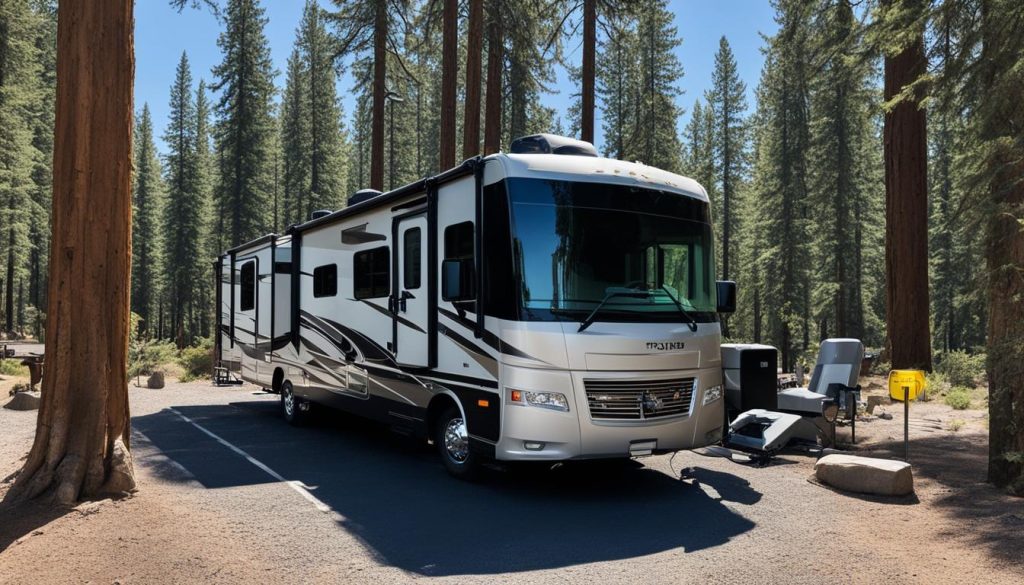
Helpful Tip:
Always double-check the compatibility of your RV’s electrical system with the campground’s power supply before attempting to hook up. Using incompatible equipment can lead to electrical damage and pose serious safety risks.
RV Electrical Hookup at Home: How to Connect to Your House’s Power
There may be times when you want to connect your RV to your house for various reasons, such as checking the system or preparing for a trip. To ensure a reliable RV electrical hookup at home, follow these steps:
- Turn off the breakers:
Before connecting your RV to your house, make sure to turn off the breakers at both your house and your RV. This step is crucial to avoid any electrical accidents or damages.
- Get the necessary equipment:
You will need a three-prong connector and a 30/50 amp adapter if your house has a 15/20 amp system. These connectors and adapters ensure a proper and safe connection between your RV and your house’s power supply.
- Connect the RV to your house:
Using the appropriate connector and adapter, plug your RV into a suitable electrical outlet in your house. Make sure the connection is secure and properly aligned before moving to the next step.
- Switch on the breakers:
Once you’ve made the electrical connection, switch on the breakers at both your house and your RV. This will provide power to your RV and enable you to use its electrical system.
It’s important to note that while connecting your RV to your home’s power can be convenient for short-term use, relying on it for an extended period can significantly increase your electricity usage and costs. It’s best to consult with a professional electrician if you plan to set up a dedicated RV electrical system at home to ensure safety and compliance with local regulations.
Here’s an overview of the steps:
| Step | Description |
|---|---|
| 1 | Turn off the breakers |
| 2 | Get the necessary equipment: three-prong connector and 30/50 amp adapter |
| 3 | Connect the RV to your house |
| 4 | Switch on the breakers |
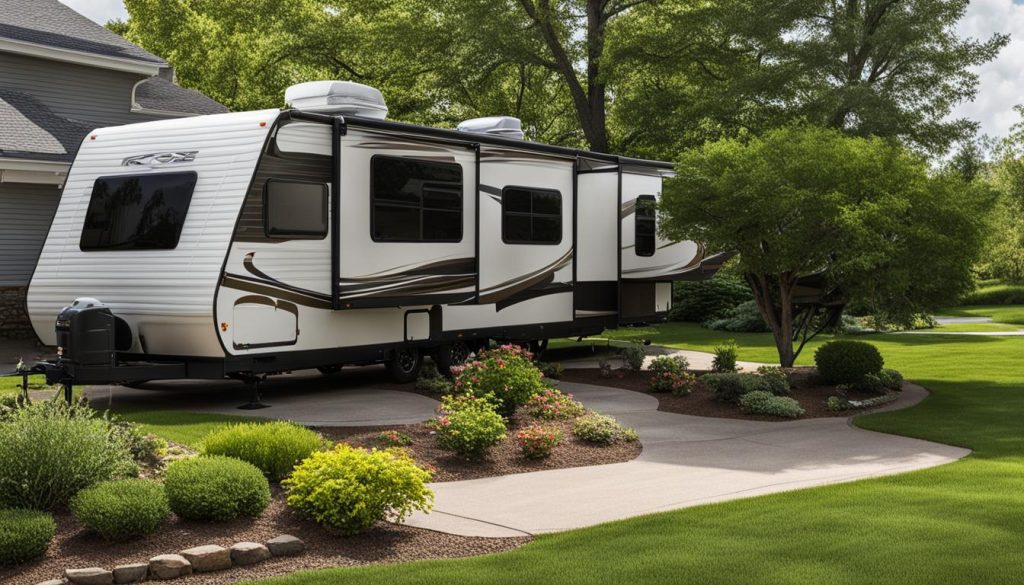
Connecting your RV to your house’s power system can provide convenience and flexibility, but it’s important to take the necessary precautions and follow the correct steps for a safe and reliable electrical connection.
Connect With Cruise America for Your RV Rental Needs
If you’re planning a camping trip and need a reliable RV rental, look no further than Cruise America. We offer a wide range of RV rentals equipped with both 30 amp and 15 amp adapters, ensuring compatibility with various electrical systems. Whether you’re a seasoned RV enthusiast or a first-time camper, our rentals are perfect for all your adventure needs.
Before you connect your rented RV to any electrical system, it’s crucial to understand the specific requirements of your RV’s electrical system and the available hookups at your campsite. Our knowledgeable staff will guide you through the process and ensure that you have everything you need for a seamless experience.
Renting an RV from Cruise America allows you to enjoy all the conveniences and comforts of an RV without the commitment of ownership. Whether you’re embarking on a cross-country road trip or exploring the beauty of national parks, our RV rentals provide the freedom and flexibility to create unforgettable memories.
Contact Cruise America today to find the perfect RV rental for your next adventure. Our friendly team is ready to assist you in choosing the right RV and making sure you have all the necessary equipment, including RV electrical system rentals and hookup rentals. Get ready to hit the road in style and comfort with Cruise America!
FAQ
How do I hook up my RV to my house’s electrical system?
To hook up your RV to your house’s electrical system, you can either have the necessary setup installed when you buy the RV or install a 30/50 Amp hookup at your home. If you are using a standard outlet, you can use an outdoor extension cord and an adapter. Make sure to turn off all appliances before plugging in the extension cord to prevent any electrical issues.
What is a power hookup for an RV?
A power hookup, also known as shore power, refers to connecting your RV to a power source provided by a campground or an outlet. RVs typically require either 30 amp or 50 amp electrical service.
How do I connect my RV to a campground electrical system?
When hooking up your RV to a campground electrical system, ensure that everything is turned off in your RV and shut off the campsite’s power supply. Connect your RV’s plug to the campground power box, using an adapter if necessary. Switch on the campsite’s breaker to provide power to your RV.
Can I connect my RV to my house’s power?
Yes, you can connect your RV to your house’s power. To do so, you will need a three-prong connector and a 30/50 amp adapter for a 15/20 amp system. Ensure that the breakers are off at both your house and your RV. Connect the RV to your house using the appropriate connector and adapter, then switch on the breakers to provide power to your RV.
Where can I rent an RV with the necessary electrical hookup?
Cruise America offers RV rentals with both 30 amp and 15 amp adapters. They provide various RV models equipped with the necessary adapters for a hassle-free experience. Contact Cruise America to find the perfect RV for your next adventure.

